
Located on the quiet street of Jalan Ceylon sits one of the most understated Malay restaurant in Kuala Lumpur, Bijan Bar & Restaurant Fine Malay Cuisine. The restaurant served traditional Malay cuisine, but unlike many, with a touch of finesse. Bijan seeks to deliver an experience that is not very common, refined Malay dining. The dishes can be served in traditional sharing style, or if you opt for a journey of culture, the degustation menu. Their dishes range from the refined sup tulang sum sum, a modern take on the bone marrow soup to the use of the uncommon sambal hitam Pahang, a sambal made from belimbing buluh, a type of starfruit.

As you enter the restaurant, you are greeted with traditional Malay wooden furniture, with motives carved into the wooden structures. The restaurant has an outer foyer, which can be used for cocktail receptions. The restaurant itself hosts quite a number of tables, for intimate dinners, business engagements and family feasts. The bar offers a decent selection of wine and cocktails, which upon request, can be paired with the degustation menu. The outdoor dining area is enclosed with bamboo and offers much elegance. The indoor dining area can be sectioned for private catering events, and the mood lighting brings the room together.
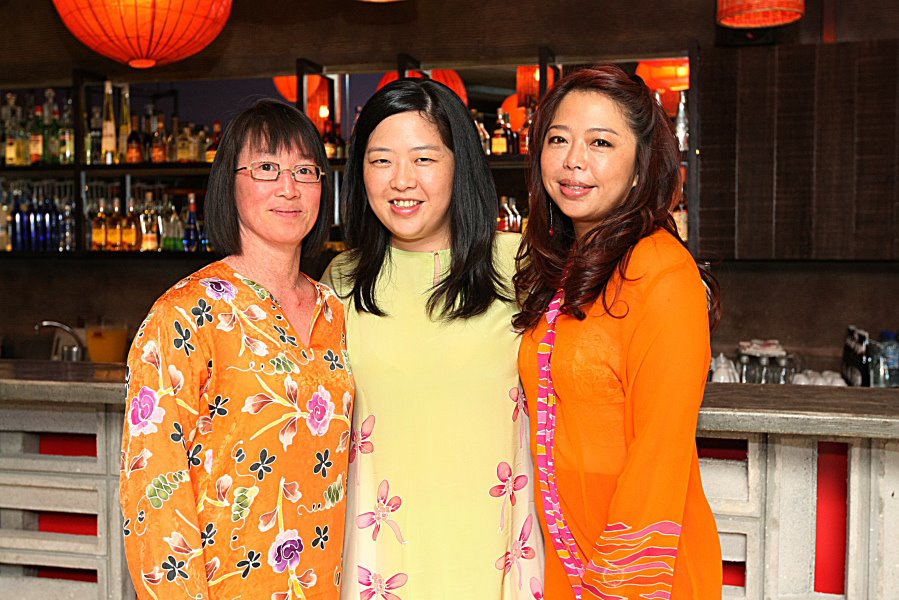
Bijan is owned by The Good Food Trio, Yuen Sze To, Lissa Yeoh and Way Cheng Yeoh, and aims to deliver a marrying of the modern with the traditional. The dishes are unmistakably Malay, although is elevated in the use of fine and high quality ingredients. Yeoh herself has been hands on in creating the dessert menu, including some of their iconic signatures like the pandan pudding (screwpine pudding), chocolate durian cake and coconut ice cream. When asked about the philosophy of Bijan, the trio replied: –
“Bijan’s philosophy and main focus has and always is about producing authentic and flavourful Malay cuisine. We firmly believe that using better quality ingredients help elevate the entire dish. A prime example would be Bijan’s Masak Lemak Udang Tempoyak where fermented durian is used to make the sauce, giving it its unique taste. To make this dish, Bijan uses D24 durians specifically for its creamy texture yet bittersweet flavour, and then undergo a shorten fermentation period (compared to the original recipe) so that the final product is less pungent hence suitable for all to try and consume.
Bijan’s chefs are also very innovative in terms of the cooking methods they use to produce stunning results. Bijan’s Rendang Itik is an illustration of this innovation where the duck meat is cooked slowly in its own fat, also known as confit that is widely used in French cuisine. The chefs believed that through this method the flavours of the duck meat is further enhanced. The duck is then deep-fried to add crispiness to the dish and finally top it off with a typical rendang sauce to compliment the duck. Chef Shawal and his team are constantly challenging themselves to create new dishes that excites customers for more. The latest creation is Rusuk Panggang where beef ribs are used instead of meat. It is uncommon for Malaysians especially Malays to eat roasted beef ribs as it is not a favoured part of the cow (as it contains lesser meat), but Bijan soaks and marinates the beef ribs in its secret sauce and roast it till it is almost black yet the meat is still juicy and tender. It is then easily peeled off the bone that has gotten regular customers repeating their orders whenever they return.
In short, Bijan places itself as an education platform for those who are not familiar with authentic Malay cuisine. At the same time, Bijan is the forefront of recreating almost-forgotten recipes handed down by generations and are always curious to look for ways to better improve its dishes through using various cooking methods. “— Yuen Sze To, Lissa Yeoh and Way Cheng Yeoh, Owners of Bijan Bar & Restaurant.

The kitchen is helmed by Sous Chef Shawal Basri, who has years of experience running the kitchen at The Datai Langkawi. Chef Basri hails from Kedah and brings his heritage onto the plates he prepares. Some of his latest creations include the rusuk panggang (chargrilled beef ribs) and rendang itik (duck rendang). The rendang is a traditional beef dish of Minangkabau settlers in Malaysia origin from Indonesia, and is one of the region’s most icon dishes. What Bijan delivers, however, is these dishes of humble origins but with high quality ingredients, such as using beef ribs for the rendang as they have a more tender bite. When asked what his favourite ingredients to use are and what his favourite dish on the menu was, he said: –
“I like using Gula Melaka (palm sugar) as it’s a versatile ingredient that can be added into any dish, be it savoury or sweet, and it’s healthier than regular sugar. Most important is that gives off a subtle flavour that is not overpoweringly sweet that most regular sugar contains. I also like using Pandan leaves and extract into his desserts as it gives off a lovely fragrance that most Malaysians are familiar with. When it comes to dishes, I recommend the Masak Lemak Ikan Kurau dengan Pisang Kapas which are Threadfin fillets cooked in lightly spiced coconut milk with young banana; the Pucuk Paku Goreng Tahi Minyak, wild fern stir-fried with chili, caramelised coconut and shrimp; Aneka Pembuka Selera, a selection of bijan’s starters: cucur udang, popiah goreng, daging bungkus kukus and pegedil; and the Opor Rusuk, Australian beef ribs slow-cooked in a thick gravy of aromatic spices, toasted coconut, palm sugar and coconut milk.” — Shawal Basri, Sous Chef of Bijan Bar & Restaurant.

The Dining
The À la Carte Menu consists of a variation of Malay regional cuisines such as the Rendang Tok from Perak, Sambal Hitam from Pahang and Ayam Masak Kuzi from Kelantan. The menu is quite varied, with most dishes that you do not find commonly in Malay restaurants as they are heritage dishes and are more commonly cooked at home. For the dining couple, there is a 4 Course Menu to choose from, and for those seeking the full experience, there’s the Dégustation Menu, consisting of 9 courses.

The first dish, an appetiser platter, was the Ulam Ulaman (Malay Style Salad), consisting of a salad of leaves made from Daun Tenggek Burung (euodia leaves), Ulam Raja and Daun Gajus (cashew leaves) served with Sambal Bacang (Mango sambal), Sambal Kulit Limau (lime rind sambal), Sambal Hitam (black sambal), Sambal Hijau (green chilli sambal), Sambal Belacan (shrimp paste sambal) and assorted fried crackers including keropok (prawn crackers) and empingan (belinjo crackers). This salad was served beautifully in a crown of leaves, with a side of 5 types sambal (chilli sauce). The sambals had a great variety of flavours, from sweet to sour to mildly bitter. Although all the sambals were great, it was the sambal hitam, a starfruit sambal which was sweet, sour and spicy kick which stood above the rest. This appetiser is highly recommended.

The second dish, a soup, was the Sup Tulang Sum Sum (Bone Marrow Soup), consisting of a clear broth of cattle bone marrow with mixed spices. The soup consisted of a large cattle bone with marrow in-tact, and decorated with an assortment of leaves, flower petals, croutons and spices. This soup was a great modern interpretation of the humble sup tulang (beef soup), a beef broth soup with aromatics and spices as its base. The soup is eaten with the scooping of all the ingredients off the a saw cut bone, and mixed into the soup for a crunchy, drenched and savoury consommé.

The fourth dish, a meat course, was the Rusuk Panggang (Chargrilled Beef Ribs), consisting of chargrilled marinated short ribs served with pegedil, sweet soy sauce and sambal belacan. The ribs were perfectly chargrilled, with strands of meat so tender it comes apart with a tug of the fork, while the outer part crisps to a perfect crunch. The meat is so well flavoured that each bite leaves you wanting more. Pegedil or begedil is a type of Javanese potato and meat croquette made with spices, and is eaten with the sweet soy sauce, giving it a nice intense sweet-savoury touch. This is definitely one of the better rendang dishes you will find, anywhere.

The fifth dish, a fish course, was the Ikan Siakap Sos Asam (Siakap In Tamarind Sauce), consisting of deep fried sea bass with a peanut and tamarind sauce, served with raw four-angled bean, red onion and chilli. The fish was prepared in the traditional Malay style known as the ‘dancing fish’, where the whole fish is cut at an angle and deep fried. This is what gives the fish its iconic shape. The tamarind sauce was quite mild, but did not take away from the preparation of the fish. The side of four angle bean, red onion and chilli mixed well and added a nice sharp tang and heat to the fish.
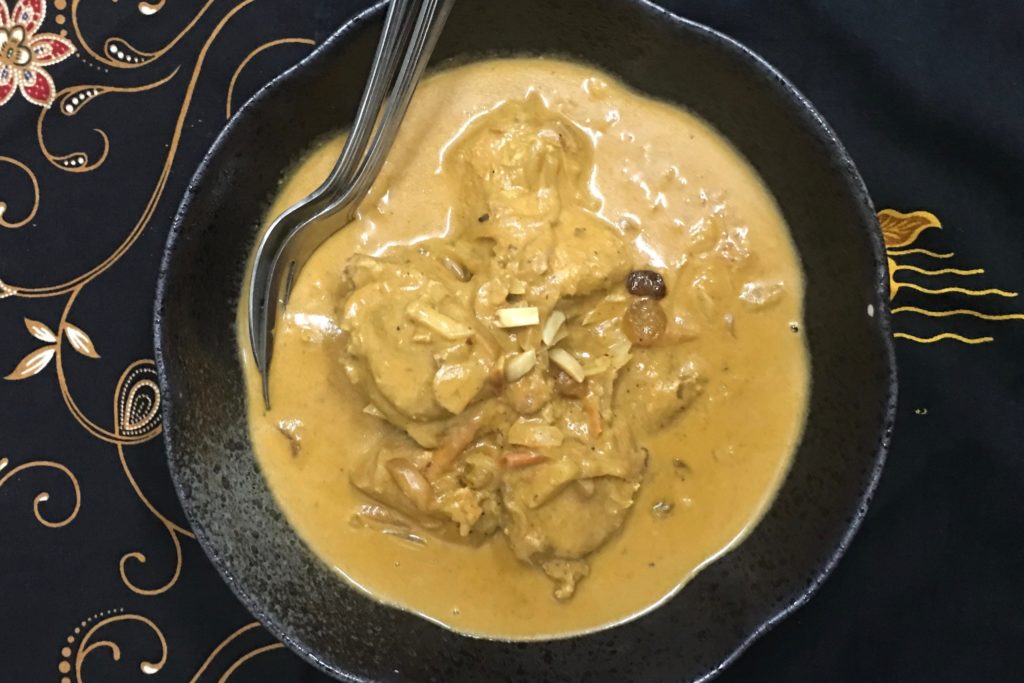
The sixth dish, a chicken course, was the Ayam Masak Kuzi (Kuzi Style Chicken), consisting of chicken pieces with spices, fresh tomatoes, almonds and raisins simmered in coconut milk gravy. This dish is typical of Kelantanese cuisine, which tends to lean towards the sweeter and rich. The chicken was tender and well marinated, with a nice peanutty flavour and not overtly spicy. This dish is reminiscent of Arab and Indian cuisine, quite similar to a chicken korma.

The seventh dish, a seafood course, was the Masak Lemak Udang Dengan Nenas (Prawns And Pineapple In A Rich Turmeric Gravy), consisting of prawns and pineapple chunks cooked in lightly spiced coconut milk. The prawns used were traditionally tiger prawns, which is cooked shell on to prevent the flesh from becoming rubbery and for the shells to impart more flavour. The pineapple added a nice sweet and tangy flavour to the dish.
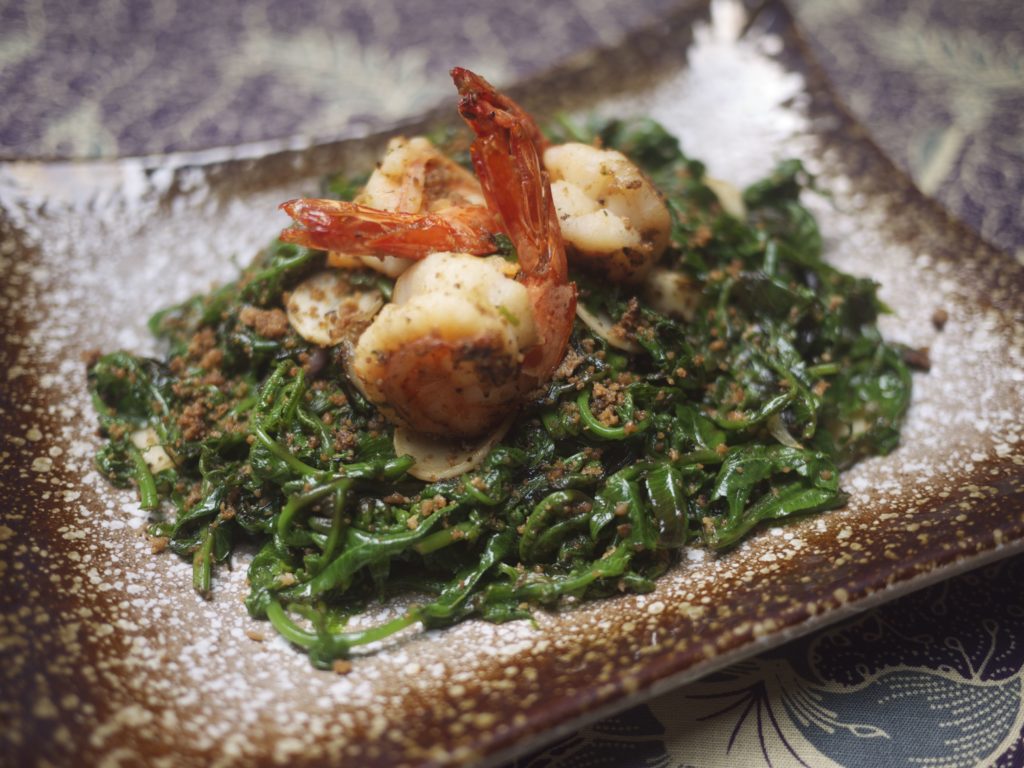
The eight dish, a vegetable course, was the Pucuk Paku Goreng Tahi Minyak (Wild Fern With Burnt Desiccated Coconut), consisting of wild fern stir-fried with chili, caramelized coconut and shrimp. The Malay term ‘tahi minyak’ refers to the leftover from the deep frying of desiccated coconut, leaving a burnt but full of umami flavoured ingredient which only a spoonful is drizzled over the dish. The fern itself was young, nimble and curly, and because of its age, crispy and not woody. This very simple dish is packed with flavour from the caramelised coconut, and a touch of sweetness and texture from the springy prawns. A definite must try.
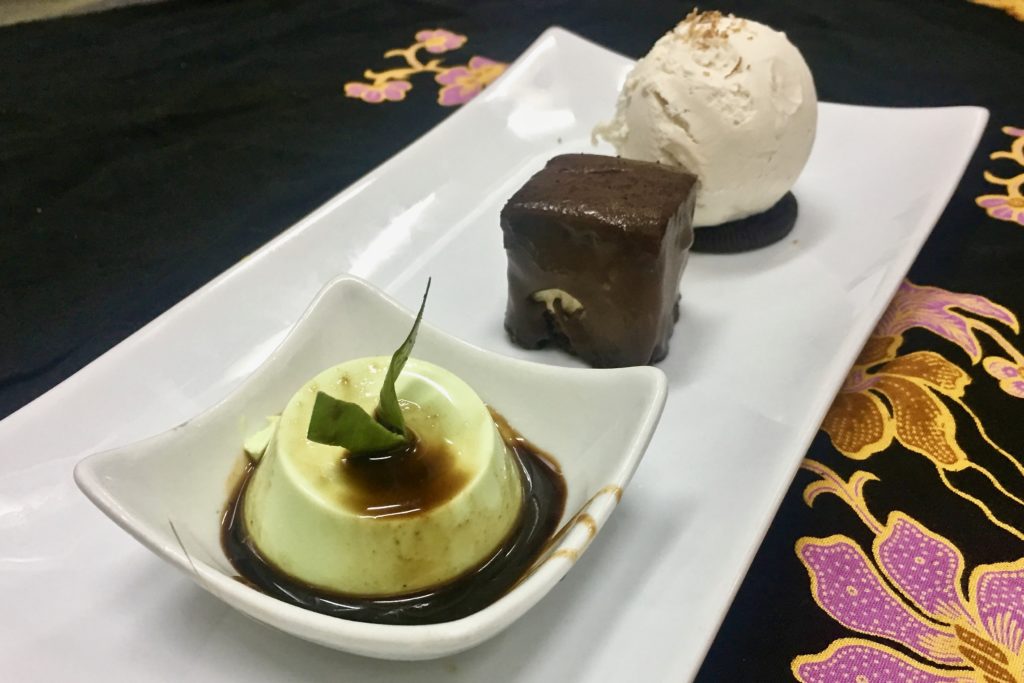
The ninth dish, a trio of dessert, was the Dessert Platter consisting of the Puding Pandan (Screwpine Pudding), Chocolate Durian Cake and Ais Krim Kelapa (Coconut Ice Cream).
The first dessert, the Puding Pandan was made from cream pudding infused with pandan leaves and palm sugar syrup. The pudding was akin to a panna cotta, and was fragrant from the pandan leaves and complemented well with the molasses rich palm sugar. This dessert tastes so good you wish there was more of it.
The second dessert, the Chocolate Durian Cake was made with D24 durian flesh, sandwiched between a moist chocolate cake and coated in chocolate ganache. At first sight, you wouldn’t think that this could work, but it strangely does. As durian is an acquired taste, consider before ordering, although if you were a durian and chocolate fan, this would be a dream.
The third dessert, the Ais Krim Kelapa, is a home made coconut ice cream, with subtle flavour and pronounced sweetness. The best part is the oreo cookie used as its base to hold it, giving a nice chocolate crumble texture.

Selera Warisan Negeri Buffet
As a restaurant that serves traditional Malay cusine, Bijan is also offering a buffet menu in conjunction with the month of Ramadhan. This menu will take you on a journey across Malaysia from north to south. The buffet station includes grill stations where dishes can made to order. Fan favourites like Laksa Kedah, keropok lekor (fish sausage) from Terengganu, solok lada (stuffed chilli peppers) and gulai daging umbut (beef and palm shoots in turmeric curry) from Kelantan and asam pedas daging tetel (cheap cut beef tamarind curry) from Johor. The ramadan buffet is priced at RM110++.
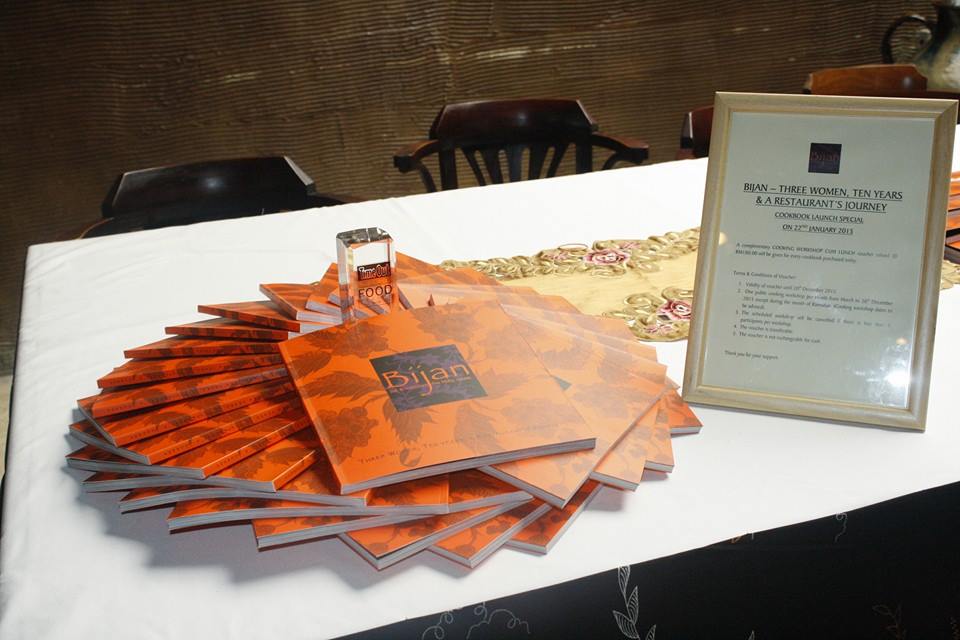
Bijan Cookbook
If you want to recreate some of the dishes that you have tasted at Bijan, you can consider purchasing their very own cookbook, Bijan – Three Women, Ten Years & A Restaurant’s Journey. This cookbook shares some of their restaurant’s signature secret authentic Malay recipes from a restaurant which has more than 10 years where you can recreate Bijan recipes from the comfort of your own home. Bijan cookbook retails at RM68.

The Bijan Bar & Restaurant Experience
There are many Malay restaurants in Kuala Lumpur, but few and far between will be like Bijan. This restaurants gives you all the trimmings of a traditional Malay dinner, but in an elevated setting. The restaurant is true to its roots by keeping to old as time recipes, but with a twist of high quality ingredients. The best thing about Bijan is that is caters to every function and palate, be in if you’re looking for a course by course style, or family style where the main dishes are served all at once with rice, as can be seen from Bijan’s Menu. When it comes to service, the Owner’s hold by this belief: –
“For us, service is not just about the table services but it encompasses the whole dining experience from quality to taste to presentation of food and finally the table service from ground staffs to customers. And thanks to internet, Malaysians are learning more about the dining scenes in Malaysia and through each dining experience they become more sophisticated hence they have higher expectations in both taste and service provided. Which is why service is highly prioritised in Bijan because it determines whether customers had a great time in Bijan, and if they do, there is a higher chance of revisits as well as introducing Bijan to their friends and family through positive word of mouth. In Bijan, we hope that customers are able to taste various refined authentic Malay cuisine in a comfortable setting that most Malay restaurant do not provide. It’s also a great entry level for those who are not familiar with Malay cuisine.”
For a refined Malay cuisine experience, we highly recommend this as a place to for those not familiar with the range that authentic almost forgotten Malay recipes Bijan has to offer. Bijan is also unique as it offers wine pairing with Malay cuisine all within the limits within the heart of the Kuala Lumpur city centre.
3 Jalan Ceylon,
50200 Kuala Lumpur.
+603 2031 3575
Opening Hours:
4.30 pm to 11.00 pm
| PHOTOGRAPHY BY: NICHOLAS NG & THE GOOD FOOD TRIO | WEBSITE: BIJAN BAR & RESTAURANT |